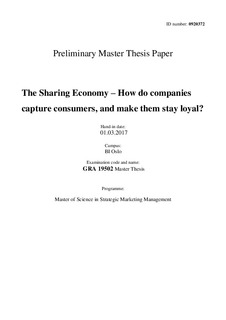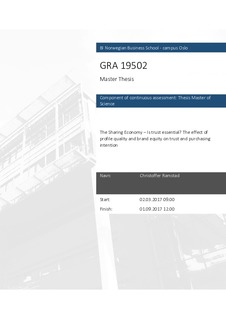| dc.description.abstract | The sharing economy has gained popularity in the last decade and is projected to
grow substantially in the future. Several brands from the sharing economy have
equally high valuations as the biggest brands in the traditional industry within the
same category. However, some issues need to be addressed before the high praises
can become a reality. This paper addresses a fundamental issue within the sharing
economy: trust. Trust has been addressed in business-to-commerce (B2C) and
interpersonal literature; however, there is no unique definition, and research on the
sharing economy is still scarce. How is trust created in the sharing economy and
what are its effects are open questions. This thesis examines whether the quality
perceptions of brands and peers have an effect on trust and purchasing intentions.
The remainder of this thesis is organized as follows. In the first part, the research
conceptualizes a peer’s profile quality and brand equity; and explore its effects
concerning trust in both a peer and a brand. The second parts analyses trust
antecedents in the sharing economy, addressing the different strands in the
literature. In the last part, the research investigates whether both brand trust and
peer trust significantly affect a person’s purchasing intention toward a sharing
economy company.
The thesis provides a thorough review of the state of research in brand equity,
profile quality, brand and peer trust, trust antecedents of peer and brand trust, and
their effect on purchase intention in the sharing economy. Based on the review, the
research develops 9 hypotheses and test these using an experimental design with a
2 (low brand equity vs. high brand equity) x 2 (low profile quality vs. high profile
quality) between subject design. The study is based on surveys submitted to all
types of respondents. The main finding of this study is that profile quality has direct
effects on both brand and peer trust, while brand equity has no significant direct
effect. However, brand equity was found to have a moderating effect on peer trust
when profile quality is perceived as low. In addition, brand trust and peer trust were
both found to be reliable predictors of a person’s purchase intention. Also, in line
with previous studies, the trust antecedents of ability, benevolence, and integrity
were found to be significant building stones of trust toward both peer and brand in
the sharing economy. | nb_NO |

